
How to Plan a Successful Event?
Organizing an event requires careful planning to ensure everything runs smoothly. Several key steps are essential to guarantee a seamless experience, from defining objectives to post-event evaluation. A solid plan helps anticipate potential issues, optimize organization, and create a positive experience for attendees. In this article, we’ll walk you through the key steps to successfully planning an event.
The Basics of Good Organization
Define the Event’s Objectives
Before anything else, it’s important to determine what you want to achieve with the event. This will guide all decisions that follow. Ask yourself about the main goal: Is it a product launch, a conference, a wedding, or a corporate gathering? Each type of event has specific requirements and different objectives. Once the goal is set, it becomes easier to choose the right strategies to bring it to life.
Set a Budget
Budget planning is a crucial step to avoid unnecessary expenses and ensure the event remains financially viable. You need to assess the costs of every element: venue rental, catering, entertainment, communication, and logistics. A well-structured budget helps identify priority expenses and adjust if necessary. It’s always wise to allocate a margin for unexpected costs to avoid unpleasant surprises.

Choose the Date and Venue
The choice of date and venue has a direct impact on the event’s success. It’s important to pick a time that suits your target audience and doesn’t clash with other similar events. The venue should match the event type, be accessible to attendees, and provide the necessary infrastructure.
Logistics and Communication
Plan the Logistics
Efficient logistics planning ensures everything runs smoothly on the day of the event. You need to organize the venue layout, manage invitations, signage, and technical requirements. It’s also crucial to coordinate with vendors such as caterers, sound and lighting technicians, and speakers. Anticipating these elements in advance ensures a seamless setup and minimizes the risk of issues.

Promote the Event
To ensure strong attendance, a solid communication strategy is essential. Depending on your target audience, you can use various channels: social media, emails, posters, or online advertising.
Manage Registrations and Ticketing
If your event requires registration or ticketing, it’s important to have a clear and efficient system in place. Online platforms like Eventbrite simplify the process and allow real-time tracking of attendees. Proper registration management helps anticipate logistical needs and ensures a smooth experience for guests.
How to Ensure Event Success
Prepare for the Unexpected
No matter how well you plan, unexpected situations can always arise. It’s useful to have a contingency plan in place to handle technical issues, delays, or last-minute cancellations. Quick problem-solving and clear communication within your team help minimize disruptions and keep the event on track.
Ensure Smooth Execution on the Day
On the event day, effective coordination is key to making sure everything goes as planned. A final team briefing, checking the setup, and ensuring all stakeholders are ready are essential steps. Managing attendee flow, schedules, and activities efficiently contributes to a positive experience for everyone.
Analyze Results and Gather Feedback
Once the event is over, evaluating its success is crucial. Collecting feedback from attendees and partners helps identify strengths and areas for improvement. Analyzing results allows you to refine future event planning and optimize upcoming experiences.
Planning a successful event relies on thorough organization and attention to detail. Each step, from setting objectives to post-event analysis, plays a role in ensuring a smooth execution. Strong coordination and effective communication are the keys to delivering a great experience for both participants and organizers.